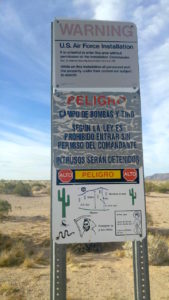The desert around Ajo, in the western reaches of southern Arizona near the border, is a vast wilderness. Much of it is without public-access roads, making humanitarian aid incredibly difficult.
Since the beginning of December 2016, No More Deaths volunteers have discovered 11 sets of human remains and assisted in their recovery.
“Prevention through deterrence” distributes nearby Border Patrol checkpoints in such a way as to force people into the desert for weeks at a time. In tandem with the lack of water and the extreme heat, these checkpoints mean that the number of deaths in the Ajo corridor is staggering.
Recently, No More Deaths has been spending more time in the Ajo corridor, developing strategies to better provide humanitarian aid here. As a result of this exploration, since the beginning of December 2016, No More Deaths volunteers have discovered 11 sets of human remains and assisted in their recovery. When remains are found, we work closely with the sheriff and medical examiner, sometimes over the course of several weeks, to make sure that a thorough, respectful recovery is done.

Southern Arizona has thousands of unsolved missing-persons cases involving border crossers; every set of remains recovered is an opportunity to provide closure to a family waiting for word.
To say that many people are dying in the Ajo corridor is an understatement; the fact that we’ve found so many human remains in our limited forays into the area should give some indication of just how serious the crisis really is. Many of the remains we have found have been in the Cabeza Prieta Wilderness, an area characterized by flat, open expanses that bristle with cholla and shimmer in the summer heat, alternating with snaking ridgelines of jagged, impassable mountains.
There are several unique challenges to providing aid in Cabeza Prieta, the biggest challenge being the lack of road access. Due to its “wilderness” designation, none of its rough dirt roads are open to the public — though they are used frequently by the Border Patrol.
We are appealing for road access within the wilderness area. With such access, we would be able to carry in much more water.
No More Deaths volunteers carry as many as eight gallons of water in their packs while on patrol, as well as food and medical supplies, and are able to cover up to several miles a day on foot. This is, however, barely enough access to scratch the surface of the need that is Cabeza Prieta.
We are appealing to the managers of both the Cabeza Prieta National Wildlife Refuge and Organ Pipe Cactus National Monument for road access within the wilderness area. With such access, we would be able to carry in much more water, hopefully establish permanent drops, and help make the corridor less lethal.
Featured photo: Carrot Quinn.

